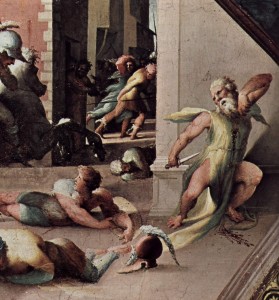 Early modern Europe found new fascination in the classical past, but how that past was conceived varied widely. This conference will explore diverse notions of antiquity across Europe in the early modern era, challenging assumptions about a Greco-Roman past and a ‘Renaissance’ that were both universal and monolithic. It is already well known that multiple ‘antiquities’ informed the artistic and literary culture of Rome, Florence and Venice and much recent work has been done on the reception of antiquity in France, Germany and the Netherlands. Our conference will consider how this research has fundamentally changed the perception of European antiquarianism and further explore the reception of the classical past on the local and regional level.
Early modern Europe found new fascination in the classical past, but how that past was conceived varied widely. This conference will explore diverse notions of antiquity across Europe in the early modern era, challenging assumptions about a Greco-Roman past and a ‘Renaissance’ that were both universal and monolithic. It is already well known that multiple ‘antiquities’ informed the artistic and literary culture of Rome, Florence and Venice and much recent work has been done on the reception of antiquity in France, Germany and the Netherlands. Our conference will consider how this research has fundamentally changed the perception of European antiquarianism and further explore the reception of the classical past on the local and regional level.
European communities considered local antiquities as living testaments to their antique origins, whether real or fictive. They looked not only to Greco-Roman antiquity, but also to the culture of pre-Roman, indigenous populations. Cities and regions shaped their notions of the ‘antique’ not only from a classical heritage but also that of more recent past, as when medieval objects or texts were believed to be ancient or purposely re-fashioned as such. Real or fictive ruins, inscriptions, or literary works could be used to demonstrate aparticular idea of the ancient past or as a statement of civic pride. Described in poetry or other texts, antiquities were central to the literary traditions of local communities; works of art and architecture either redeployed spolia of recognizable local provenance or were characterised by a regional concept of the antique. Adopting an interdisciplinary and comparative method, the conference aims to investigate such issues.
We seek abstracts for papers that explore local concepts of the antique in the form of archaeological excavations, works of art, architecture, or texts. How were local antiquities used to construct a sense of identity for civic bodies or individuals? How did imported modes of classical revival merge or clash with local idioms? How did local communities respond to or attempt to rival Rome and other heirs to antique traditions?
Papers might address issues of competing ‘antiquities’, the character and priorities of local concepts of the antique, or relationships between concepts of antiquity in various regions. They might also consider wider aspects of the local reception of antiquity, such as patterns in myths of origins that recur in different areas of Europe. We would welcome any topic dealing with the impact of local conceptsof antiquity in early modern literature, antiquarianism or the visual arts.
This 2-day conference organised by Kathleen Christian (The Open University, Department of History of Art) and Bianca de Divitiis (ERC/HistAntArtSI project, University of Naples Federico II) will be held at the Warburg Institute in London on Thursday November 13–Friday November 14, 2014.
We expect to fund airfare and three nights accommodation in London for speakers who are unable to request support from their own institutions. We plan to make a video of the conference available online and to publish the proceedings.
Please send 350 word abstracts in a Word or PDF attachment by 31 July, 2013 to both Kathleen Christian (Kathleen.Christian@open.ac.uk) and Bianca de Divitiis (bdedivitiis@gmail.com).

Leave a Reply
You must be logged in to post a comment.